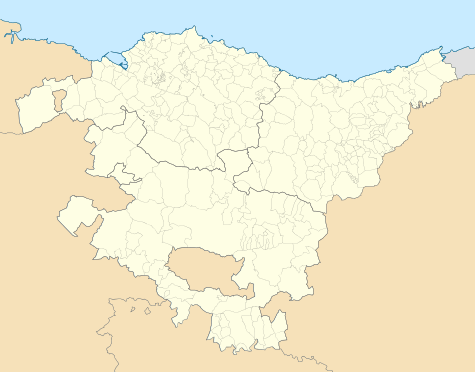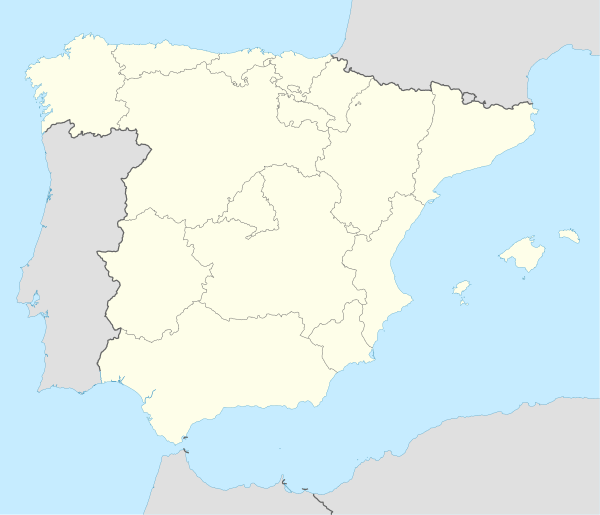Deba, Gipuzkoa
Deba is a town located in the province of Gipuzkoa, in the autonomous community of Basque Country, in the North of Spain.
Deba | |
|---|---|
Municipality | |
Deba beach | |
 Deba Location in Spain  Deba Deba (Spain) | |
| Coordinates: 43°17′43″N 2°21′0″W | |
| Country | |
| Autonomous Community | |
| Province | Gipuzkoa |
| Comarca | Debabarrena |
| Government | |
| • Mayor | Pedro Bengoetxea (Debarren Ahotsa) |
| Area | |
| • Total | 50.3 km2 (19.4 sq mi) |
| Elevation (AMSL) | 10 m (30 ft) |
| Population (2018)[1] | |
| • Total | 5,457 |
| • Density | 110/km2 (280/sq mi) |
| Time zone | UTC+1 (CET) |
| • Summer (DST) | UTC+2 (CEST (GMT +2)) |
| Postal code | 20820 |
| Area code(s) | +34 (Spain) + 943 (Gipuzkoa) |
| Website | www.deba.net |
The town centre is right on the sea, and the municipal district includes a series of charming country villages, such as Itziar, Lastur and Elorriaga. The natural setting is a perfect combination of blue sea and green mountains.
Traditionally, the attraction of Deba is based on the beauty of the landscape, its rich heritage, centuries-old culture and exquisite gastronomy. Today, it is reinforced with modern facilities, and entertainment and leisure facilities that meet all visitors' needs. Deba is a town of summer residents, but it is also on the St James's Way.
History
Thousands of years before Deba was founded, the town's relationship with sea and water already formed an indelible part of its history. The shell deposits and bone harpoons found in many caves in the Deba municipal districts and some of the figures in the Palaeolithic shrine at Ekain are testimonies of that relationship. Curiously, thousands of year later, Roman chronicles also cite the coast and the Deba, a river that would later lend its name to the town.
The town's origins date back to 1343. History tells that Sancho IV of Castile granted the citizens of "Monte-Real", in Itziar, a charter as a township in 1294. Subsequently, they moved closer to the coast and founded a new settlement that they called Monreal de Deba. In the 15th century, Deba enjoyed a period of splendour due to shipping, particularly with the export of wool from Castile and Aragón to various European countries.
In the 19th century the port declined and a new activity began: tourism. Deba's relationship with the sea changed when the town became one of the pioneers of tourism in Europe.
Currently, Deba still faces the sea with a taste of salt in the air. The town offers visitors the opportunity to enjoy a unique coast and a modern spa, thus combining fun with therapy. It has an annual festival called "San Roke festivities".
| Wikimedia Commons has media related to Deba. |
External links
- http://ocio.diariovasco.com/fotos-fiesta/deba-sanroke1.php?foto=11
- Official Website Information available in Spanish and Basque.
- DEBA in the Bernardo Estornés Lasa - Auñamendi Encyclopedia (Euskomedia Fundazioa) Information available in Spanish
- Municipal Register of Spain 2018. National Statistics Institute.
